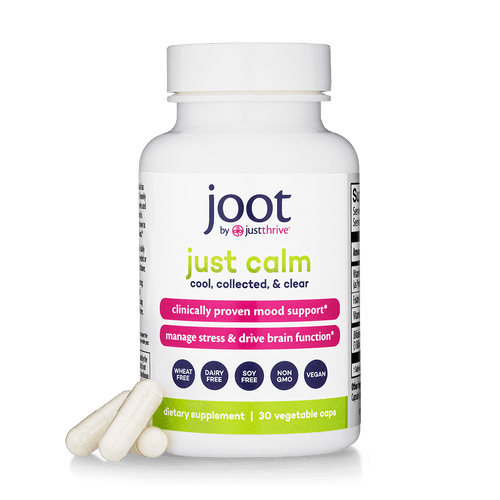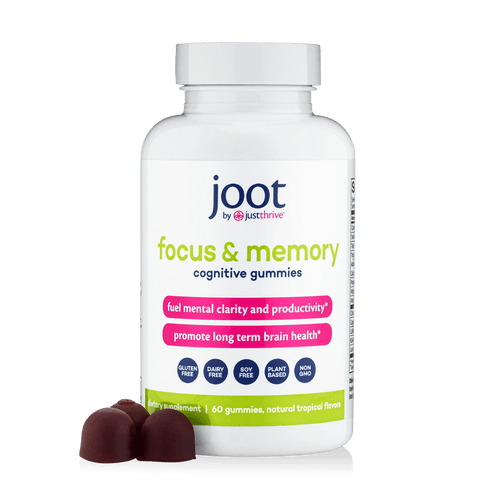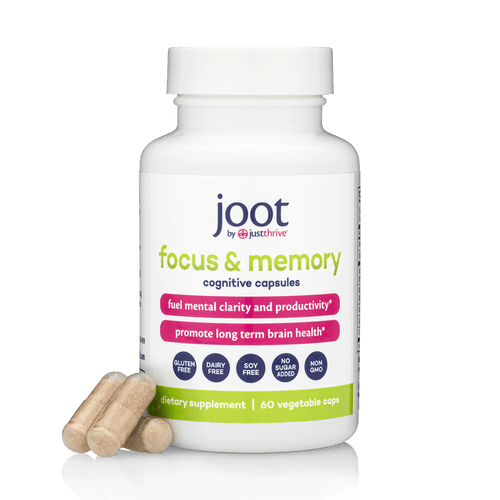The right way to spark your mind, memory, and mood
Are you having trouble focusing? Do you feel like your brain has slowed down? Or searched your memory for a word or a name you should know but couldn’t find it?
If it’s been hard to concentrate, process information, make decisions, or feel calm, you may be running low on a crucial protein called Brain-Derived Neurotrophic Factor, or BDNF.
BDNF gives your brain its spark, powering your thoughts and brightening your mood. Unfortunately, a lot of things from age to inflammation to stress can sabotage your BDNF. And that can leave you feeling tired, depressed, dull, and scattered.
So if you want to supercharge your mind… preserve your memory… sharpen your focus… and improve your mood, getting more BDNF is the answer.
BDNF Works Like “Fertilizer” for Your Brain Cells
Just like fertilizer in your garden, BDNF promotes healthy growth for your brain cells in several important ways:[1,2,3]
- sparks production of new brain cells, a process called neurogenesis
- helps brain cells to survive and self-repair
- strengthens and regulates synapses, the connectors between brain cells that help them communicate with each other
- increases neuroplasticity, your brain’s ability to adapt and reorganize itself as you experience and learn new things
- helps manage important neurotransmitters like serotonin
BDNF makes it possible for you to think, understand, and focus. It plays a role in your mental health and your ability to deal with stress. Your brain simply can’t function without plenty of BDNF on board.

How BDNF Levels Affect Your Life
BDNF affects every brain cell and brain function. When levels are running low you’ll feel slower, sadder, and more forgetful. With plenty of BDNF you’ll feel sharper, calmer, and happier. Cutting edge research shows that decreasing BDNF is directly linked with neurodegenerative diseases such as Alzheimer’s disease, Parkinson’s disease, and multiple sclerosis.[4]
It’s so important to brain health that doctors and scientists use it as a biomarker for cognitive impairment, chronic fatigue, and depression.[5,6]
Here’s are four ways changing BDNF levels can affect you:
- Cognition. Your brain cells need BDNF to learn, communicate, adapt, and store memories. Higher levels of BDNF offer protection against cognitive decline.[7] Low levels of BDNF predict cognitive deterioration and worse cognitive performance.[8]
- Fatigue. Low levels of BDNF can increase fatigue.[9] The protein plays a role in energy regulation, and decreased levels can lead to low energy and exhaustion.[10]
- Memory. Memory formation, structure, and retention depend on BDNF.[11] Decreasing BDNF levels can cause memory loss and difficulty retaining and recalling memories.[12]
- Mood. Low BDNF levels play a key role in depression.[13] This protein manages production and uptake of neurotransmitters including serotonin, signaling when increased production is needed.[14] Without sufficient BDNF, serotonin levels can run low as well, increasing the risk of depression.
Your body naturally produces BDNF throughout your life, but production slows down as you get older.[15] Other factors like chronic inflammation and oxidative stress also decrease BDNF levels.
Since time and everyday life can lower BDNF, you’ll want to do everything you can to keep your levels as high as possible.

7 Ways to Increase Your BDNF Levels Naturally
Increasing your BDNF will deliver lots of brain power benefits. From clearer thinking to more focused decision making to brighter moods to more mental energy, a BDNF increase can bring on significant changes.
Luckily, there are a lot of ways to effectively increase BDNF naturally. Here are 7 of the best and fastest ways to get more BDNF.
- Exercise: Physical exercise can substantially raise BDNF levels, even after just one session. Long-term exercise can keep those levels elevated. One study found that doing regular aerobic exercise for at least 16 weeks increased BDNF significantly.[16]
- Brain challenges: Whether you learn something new, use your opposite hand, or do puzzles challenging your brain, it leads to more BDNF. Research shows that cognitive training leads to higher BDNF levels and higher scores on cognitive tests.[17]
- Stress reduction: Stress can deplete BDNF dramatically. The physical changes involved in the stress response reduce BDNF, and chronic stress can take a huge toll on this critical brain protein.[18] You can reduce the effects of stress by helping your body manage it better. Proven stress reducing methods include mindful meditation, focused breathing techniques, and spending time in nature.
- Probiotics: A healthy gut microbiome promotes BDNF production. Beneficial bacteria in the gut produce short chain fatty acids such as butyrate and acetate that help regulate BDNF and its production. Including probiotics in your daily routine helps keep your gut microbiome in healthy balance for optimal SCFA and BDNF production.[19,20]
- Flavonoids: Flavonoids are plant chemicals that deliver tons of health benefits, from antioxidant protection to supporting brain health. Two randomized controlled clinical trials found that increasing flavonoid intake by eating more fruits, vegetables, and cocoa effectively raised BDNF levels within just 12 weeks.[21]
- Lion’s Mane mushroom: Lion’s Mane is a unique mushroom used extensively in Traditional Chinese Medicine. This special mushroom is known to increase BDNF levels and deliver brain benefits.[22] A double-blind pilot study of young adults showed that a single dose of Lion’s Mane improved performance speed on cognitive tasks and reduced stress levels.[23]
- Vitamin D3: The sunshine vitamin is proven to support robust BDNF levels. Vitamin D deficiencies can lead to lower BDNF. Supplementing with vitamin D3, the most bioactive form of this nutrient, can increase BDNF production. A meta-analysis of 13 clinical studies found that taking vitamin D3 supplements helps support BDNF production along with healthy mood and cognition.[24]
A Clinically-Proven BDNF Cheat Code
Imagine your brain feeling quick, clear, energetic, and calm every day. Being able to remember a neighbor’s name without a hitch… feeling upbeat and happy… easily absorbing new information.
All of that takes BDNF, a brain protein your body produces naturally. And you can encourage your body to keep BDNF supplies plentiful with Just Thrive Focus & Memory.
Focus & Memory was created with your best brain in mind. Focus & Memory contains carefully selected ingredients including Lion’s Mane mushroom and vitamin D3 that work together to elevate BDNF levels, supporting clarity, focus, learning, and attention.
Focus & Memory also contains more brain-supporting ingredients including:
- Citicoline
- Vitamin B12
- KSM-66® Ashwagandha root extract
- CogantiQ® coffee fruit extract
This intentional blend of safe natural ingredients can help unlock the full power of your mind.
>> Keep your BDNF levels at their peak every day with Focus & Memory for expanded brain power and brighter moods. (Also in capsules!)
Not sure if you’re ready to try Focus & Memory? We can help you with that. Every Just Thrive purchase is covered by our Bottom of the Bottle, 100% money back guarantee.
So you can try Focus & Memory to see how well it works for you… and we’re confident that you’ll notice the brain benefits.
But if for any reason you don’t feel a difference, you can ask for a full product refund at any time. Even if it’s 3 months or 3 years later. Even if the bottle is empty! You’ll get your money back any time, no matter what.
Sources
- Bathina S, Das UN. Brain-derived neurotrophic factor and its clinical implications. Arch Med Sci. 2015 Dec 10;11(6):1164-78.
- Lu B, Nagappan G, Lu Y. BDNF and synaptic plasticity, cognitive function, and dysfunction. Handb Exp Pharmacol. 2014;220:223-50. doi: 10.1007/978-3-642-45106-5_9. PMID: 24668475.
- Maiworm M. The relevance of BDNF for neuroprotection and neuroplasticity in multiple sclerosis. Front Neurol. 2024 Aug 1;15:1385042.
- Bathina S, Das UN. Brain-derived neurotrophic factor and its clinical implications. Arch Med Sci. 2015 Dec 10;11(6):1164-78.
- Peng S, Li W, Lv L, Zhang Z, Zhan X. BDNF as a biomarker in diagnosis and evaluation of treatment for schizophrenia and depression. Discov Med. 2018 Oct;26(143):127-136. PMID: 30586536.
- Pisani A, et al. The Role of BDNF as a Biomarker in Cognitive and Sensory Neurodegeneration. J Pers Med. 2023 Apr 10;13(4):652.
- Buchman AS, Yu L, Boyle PA, Schneider JA, De Jager PL, Bennett DA. Higher brain BDNF gene expression is associated with slower cognitive decline in older adults. Neurology. 2016 Feb 23;86(8):735-41.
- Domitrovic Spudic S, et al. Reduced plasma BDNF concentration and cognitive decline in veterans with PTSD. Psychiatry Res. 2022 Oct;316:114772.
- Saligan LN, Lukkahatai N, Holder G, Walitt B, Machado-Vieira R. Lower brain-derived neurotrophic factor levels associated with worsening fatigue in prostate cancer patients during repeated stress from radiation therapy. World J Biol Psychiatry. 2016 Dec;17(8):608-614.
- Marosi K, Mattson MP. BDNF mediates adaptive brain and body responses to energetic challenges. Trends Endocrinol Metab. 2014 Feb;25(2):89-98.
- Bekinschtein P, Cammarota M, Medina JH. BDNF and memory processing. Neuropharmacology. 2014 Jan;76 Pt C:677-83.
- Miranda M, Morici JF, Zanoni MB, Bekinschtein P. Brain-Derived Neurotrophic Factor: A Key Molecule for Memory in the Healthy and the Pathological Brain. Front Cell Neurosci. 2019 Aug 7;13:363.
- Correia AS, Cardoso A, Vale N. BDNF Unveiled: Exploring Its Role in Major Depression Disorder Serotonergic Imbalance and Associated Stress Conditions. Pharmaceutics. 2023 Aug 3;15(8):2081.
- Leschik J, et al. Brain-derived neurotrophic factor expression in serotonergic neurons improves stress resilience and promotes adult hippocampal neurogenesis. Prog Neurobiol. 2022 Oct;217:102333.
- Erickson KI, et al. Brain-derived neurotrophic factor is associated with age-related decline in hippocampal volume. J Neurosci. 2010 Apr 14;30(15):5368-75.
- Huang H, Li W, Qin Z, Shen H, Li X, Wang W. Physical exercise increases peripheral brain-derived neurotrophic factors in patients with cognitive impairment: A meta-analysis. Restor Neurol Neurosci. 2021;39(3):159-171.
- Nicastri CM, et al. BDNF mediates improvement in cognitive performance after computerized cognitive training in healthy older adults. Alzheimers Dement (N Y). 2022 Aug 30;8(1):e12337.
- Mondelli V, et al. Stress and inflammation reduce brain-derived neurotrophic factor expression in first-episode psychosis: a pathway to smaller hippocampal volume. J Clin Psychiatry. 2011 Dec;72(12):1677-1684.
- Molska M, et al. The Influence of Intestinal Microbiota on BDNF Levels. Nutrients. 2024 Aug 29;16(17):2891.
- Church JS, et al Serum short chain fatty acids mediate hippocampal BDNF and correlate with decreasing neuroinflammation following high pectin fiber diet in mice. Front Neurosci. 2023 Apr 11;17:1134080.
- Neshatdoust S,et al. High-flavonoid intake induces cognitive improvements linked to changes in serum brain-derived neurotrophic factor: Two randomised, controlled trials. Nutr Healthy Aging. 2016 Oct 27;4(1):81-93.
- Li IC, Lee LY, Tzeng TT, Chen WP, Chen YP, Shiao YJ, Chen CC. Neurohealth Properties of Hericium erinaceus Mycelia Enriched with Erinacines. Behav Neurol. 2018 May 21;2018:5802634.
- Docherty S, Doughty FL, Smith EF. The Acute and Chronic Effects of Lion's Mane Mushroom Supplementation on Cognitive Function, Stress and Mood in Young Adults: A Double-Blind, Parallel Groups, Pilot Study. Nutrients. 2023 Nov 20;15(22):4842
- Skoczek-Rubińska A, et al. Impact of Vitamin D Status and Supplementation on Brain-Derived Neurotrophic Factor and Mood-Cognitive Outcomes: A Structured Narrative Review. Nutrients. 2025 Aug 16;17(16):2655.














